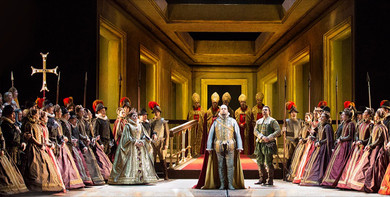About the premiere of Giuseppe Verdi’s opera Don Carlo at the Mariinsky Theatre.
On the eve of the two hundredth anniversary of the birth of Giuseppe Verdi, the Mariinsky Theatre is staging a new production of the opera Don Carlo. The premiere performances will take place on 29 and 30 November and 4 and 30 December. This will be the fourth production of Don Carlo at the Kirov-Mariinsky Theatre (previous productions dating from 1976, 1992 and 1999) and the first production of the composer’s own final five-act version in Italian, the so-called “Modena version” of 1886.
The premiere of the opera Don Carlo to a libretto by Franзois Joseph Mйry and Camille du Locle after the eponymous drama by Friedrich Schiller, one of Verdi’s favourite playwrights, took place on 11 March 1867 at the Grand Opйra in Paris.
Don Carlo was first performed in Russia on 20 December 1868 when it was staged at St Petersburg’s Bolshoi Theatre by the Imperial Italian Opera Company.
Almost twenty years later, in 1884 Verdi created a new version of his opera in four acts with a text revised by the Italian librettist Antonio Ghislanzoni. In Modena in 1886 came the first performance of yet another version of the opera – the most complete version in five acts once more and now in Italian.
In Russia, following the first production of Don Carlo in Italian the opera was dropped for a lengthy period due to the censor. In 1917 Fyodor Chaliapin gained permission for a production of Don Carlo at the Bolshoi Theatre in Moscow, where at the premiere on 10 February he himself performed the role of King Filippo which for many years to come defined the tradition of the musical and stage image of this character.
The opera Don Carlo for the Opera de Paris forced Verdi to work in the genre of “grand opera.” The complex historical background of the plot – tangled political lines and the pyres of the Inquisition – allowed Verdi to create a monumental canvas with vivid crowd scenes, while the passions and family peripeteia of the story gave the composer incredible opportunities to create psychologically intense musical images and characters.
At the Mariinsky Theatre, the opera Don Carlo is being produced by the Italian stage director Giorgio Barberio Corsetti.
Corsetti about Don Carlo: “Verdi’s Don Carlo is a very dark opera, it’s a kind of nightmare. The blind Grand Inquisitor is himself the embodiment of darkness. The darkness moves with the characters. In many late 16th century portraits the background is almost entirely black. The artist placed his image in no specific time but rather in eternity with no temporal context whatsoever. I didn’t want to have any historical reconstructions, here the story is a kind of sign, a hint. Of course, it contains eternal problems: relationships with power, relationships with a father and relationships with history.”
Giorgio Barberio Corsetti has been a recipient of the Prix Europe Nouvelles Rйalitйs Thйвtrales and frequently works in opera; he is known primarily for using video graphics in his productions. His first opera production was Donizetti’s Maria di Rohan at the Teatro la Fenice (1999). This was followed by the diptych of Poulenc’s La Voix humaine and Schoenberg’s Erwartung in Palermo, Puccini’s La Bohиme in Messina, Tosca in Florence, Bacalov’s Stabat mater in Rome and Turandot at La Scala in 2011, the premiere of which was conducted by Valery Gergiev. At the Thйвtre du Chвtelet, Corsetti has staged Gualtiero Dazzi’s Le Luthier de Venise (2004), Rossini’s La pietra del paragone (2007) and Pop’pea, an interpretation of Monteverdi’s opera L’incoronazione di Poppea using video materials and elements of pop culture (2012). Don Carlo is the second opera the stage director has undertaken, preceded by Falstaff at the Opйra National du Rhin in Strasbourg; March 2013 will see a production of Macbeth at La Scala with maestro Gergiev conducting. In 1999 Corsetti became Artistic Director of the theatre division of Venice’s biennale. 2002 saw the emergence of a new project of Corsetti’s FattoreK company entitled Metamorfosi – festival di confine tra teatro e circo, a circus and theatre festival organised together with the City of Rome Government.
The production team also includes Giorgio Barberio Corsetti and Cristian Taraborelli as Set Designers, Cristian Taraborelli and Angela Buscemi as Costume Designers, Fabrice Kebour as Lighting Designer, Luca Attilii and Fabio Iaquone as Video Designers and Roberto Aldorasi as Choreographer.
The lead roles in the opera Don Carlo are being rehearsed by Yevgeny Nikitin, Mikhail Kit and Mikhail Petrenko (Filippo II, the King of Spain), Akhmed Agadi, Avgust Amonov and Viktor Lutsyuk (Don Carlo, the Infante of Spain), Alexander Gergalov, Vasily Gerello and Vladimir Moroz (Rodrigo, the Marquis of Posa), Sergei Aleksashkin, Ilya Bannik and Mikhail Kolelishvili (the Grand Inquisitor), Irma Dzhigolaty, Anna Markarova, Yekaterina Shimanovich and Viktoria Yastrebova (Elisabeth de Valois) and Zlata Bulycheva, Olga Savova and Nadezhda Serdyuk (Princess Eboli).
The Musical Director of the production is Valery Gergiev, the Stage Director Giorgio Barberio Corsetti.
 Mariinsky Theatre:
Mariinsky Theatre:  Mariinsky-2 (New Theatre):
Mariinsky-2 (New Theatre):  Mariinsky Concert Hall:
Mariinsky Concert Hall: 

